Research Proposal: Dementia Impact on UK Elderly Health
VerifiedAdded on 2022/08/31
|20
|5133
|29
Report
AI Summary
This research proposal investigates the impact of dementia on the health and well-being of the elderly population (65+) in the UK. It begins with an introduction to dementia, its prevalence, and a review of relevant literature, including studies from the past five years. The proposal outlines the aims and objectives, focusing on understanding the gender and ethnic variances, psychological and physical well-being, and the impact of dementia policies. The methodology section details the research design, including the research philosophy (pragmatism), and the inductive research approach. The proposal also includes ethical considerations for participant recruitment and a project outline with a Gantt chart. The study aims to provide insights into the challenges faced by individuals with dementia and their caregivers within the UK healthcare context and proposes to contribute to the development of evidence-based training for healthcare professionals.

Running head: RESEARCH PROPOSAL
Research Proposal
Name of the Student
Name of the University
Author Note
Research Proposal
Name of the Student
Name of the University
Author Note
Paraphrase This Document
Need a fresh take? Get an instant paraphrase of this document with our AI Paraphraser
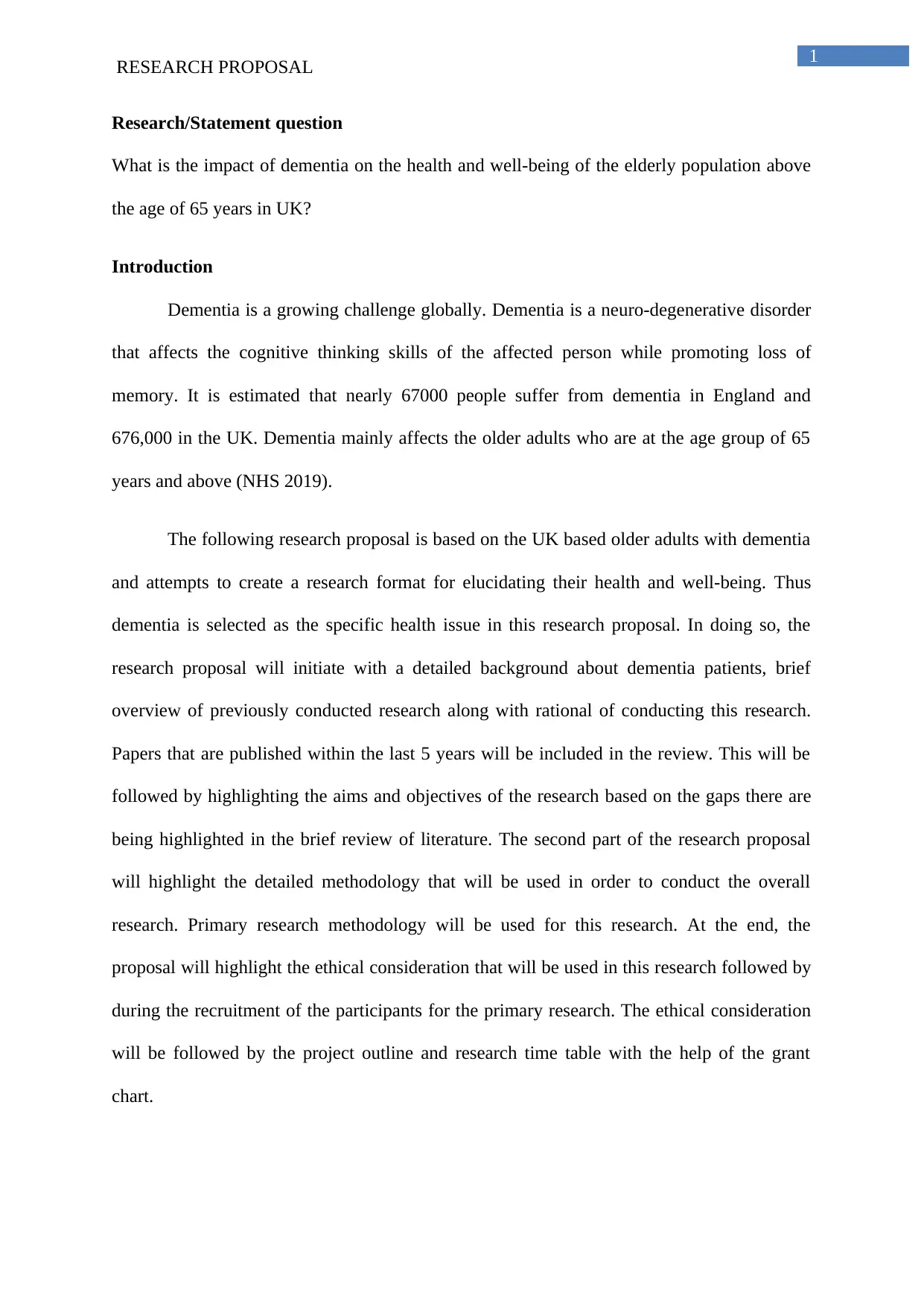
1
RESEARCH PROPOSAL
Research/Statement question
What is the impact of dementia on the health and well-being of the elderly population above
the age of 65 years in UK?
Introduction
Dementia is a growing challenge globally. Dementia is a neuro-degenerative disorder
that affects the cognitive thinking skills of the affected person while promoting loss of
memory. It is estimated that nearly 67000 people suffer from dementia in England and
676,000 in the UK. Dementia mainly affects the older adults who are at the age group of 65
years and above (NHS 2019).
The following research proposal is based on the UK based older adults with dementia
and attempts to create a research format for elucidating their health and well-being. Thus
dementia is selected as the specific health issue in this research proposal. In doing so, the
research proposal will initiate with a detailed background about dementia patients, brief
overview of previously conducted research along with rational of conducting this research.
Papers that are published within the last 5 years will be included in the review. This will be
followed by highlighting the aims and objectives of the research based on the gaps there are
being highlighted in the brief review of literature. The second part of the research proposal
will highlight the detailed methodology that will be used in order to conduct the overall
research. Primary research methodology will be used for this research. At the end, the
proposal will highlight the ethical consideration that will be used in this research followed by
during the recruitment of the participants for the primary research. The ethical consideration
will be followed by the project outline and research time table with the help of the grant
chart.
RESEARCH PROPOSAL
Research/Statement question
What is the impact of dementia on the health and well-being of the elderly population above
the age of 65 years in UK?
Introduction
Dementia is a growing challenge globally. Dementia is a neuro-degenerative disorder
that affects the cognitive thinking skills of the affected person while promoting loss of
memory. It is estimated that nearly 67000 people suffer from dementia in England and
676,000 in the UK. Dementia mainly affects the older adults who are at the age group of 65
years and above (NHS 2019).
The following research proposal is based on the UK based older adults with dementia
and attempts to create a research format for elucidating their health and well-being. Thus
dementia is selected as the specific health issue in this research proposal. In doing so, the
research proposal will initiate with a detailed background about dementia patients, brief
overview of previously conducted research along with rational of conducting this research.
Papers that are published within the last 5 years will be included in the review. This will be
followed by highlighting the aims and objectives of the research based on the gaps there are
being highlighted in the brief review of literature. The second part of the research proposal
will highlight the detailed methodology that will be used in order to conduct the overall
research. Primary research methodology will be used for this research. At the end, the
proposal will highlight the ethical consideration that will be used in this research followed by
during the recruitment of the participants for the primary research. The ethical consideration
will be followed by the project outline and research time table with the help of the grant
chart.
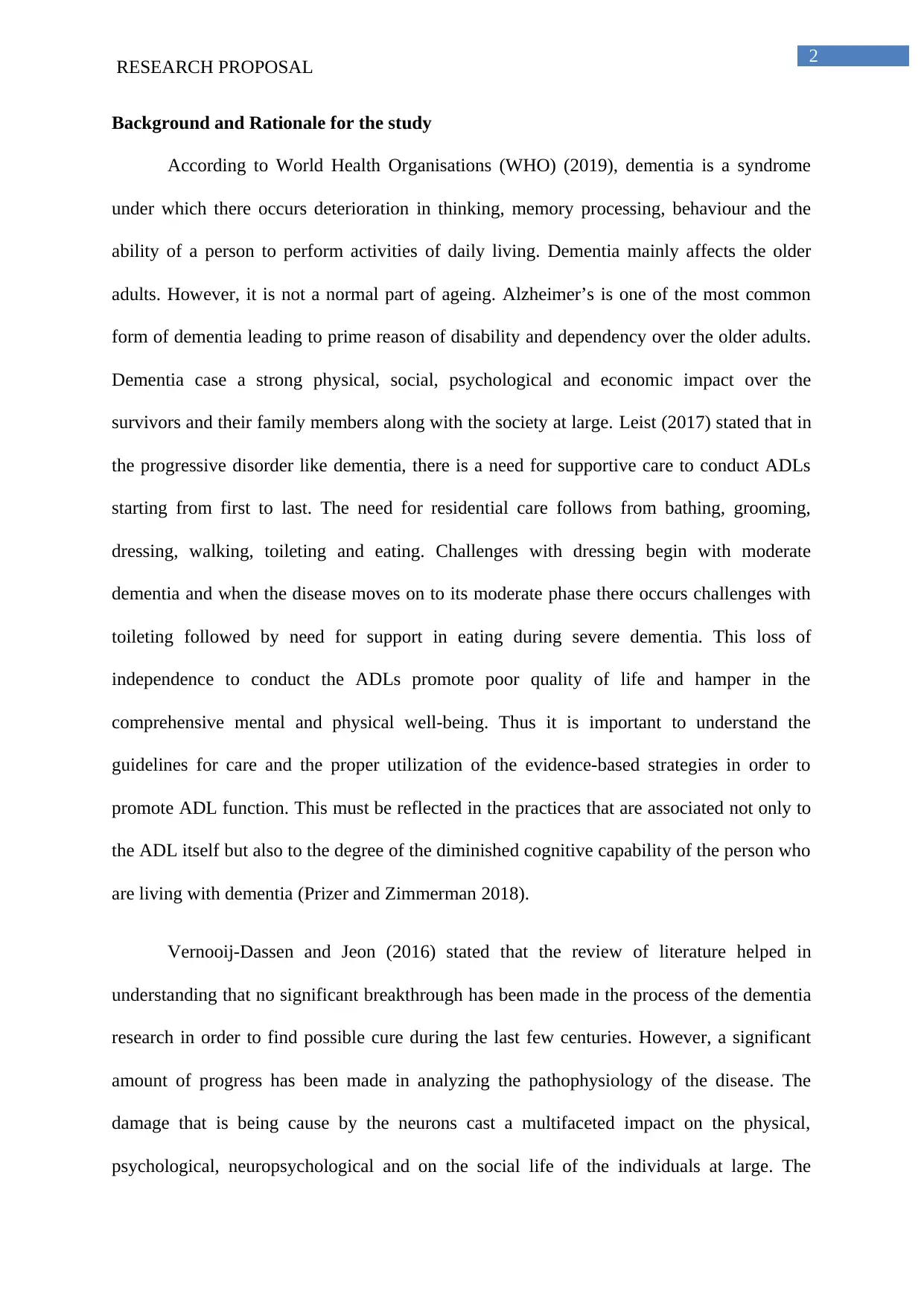
2
RESEARCH PROPOSAL
Background and Rationale for the study
According to World Health Organisations (WHO) (2019), dementia is a syndrome
under which there occurs deterioration in thinking, memory processing, behaviour and the
ability of a person to perform activities of daily living. Dementia mainly affects the older
adults. However, it is not a normal part of ageing. Alzheimer’s is one of the most common
form of dementia leading to prime reason of disability and dependency over the older adults.
Dementia case a strong physical, social, psychological and economic impact over the
survivors and their family members along with the society at large. Leist (2017) stated that in
the progressive disorder like dementia, there is a need for supportive care to conduct ADLs
starting from first to last. The need for residential care follows from bathing, grooming,
dressing, walking, toileting and eating. Challenges with dressing begin with moderate
dementia and when the disease moves on to its moderate phase there occurs challenges with
toileting followed by need for support in eating during severe dementia. This loss of
independence to conduct the ADLs promote poor quality of life and hamper in the
comprehensive mental and physical well-being. Thus it is important to understand the
guidelines for care and the proper utilization of the evidence-based strategies in order to
promote ADL function. This must be reflected in the practices that are associated not only to
the ADL itself but also to the degree of the diminished cognitive capability of the person who
are living with dementia (Prizer and Zimmerman 2018).
Vernooij-Dassen and Jeon (2016) stated that the review of literature helped in
understanding that no significant breakthrough has been made in the process of the dementia
research in order to find possible cure during the last few centuries. However, a significant
amount of progress has been made in analyzing the pathophysiology of the disease. The
damage that is being cause by the neurons cast a multifaceted impact on the physical,
psychological, neuropsychological and on the social life of the individuals at large. The
RESEARCH PROPOSAL
Background and Rationale for the study
According to World Health Organisations (WHO) (2019), dementia is a syndrome
under which there occurs deterioration in thinking, memory processing, behaviour and the
ability of a person to perform activities of daily living. Dementia mainly affects the older
adults. However, it is not a normal part of ageing. Alzheimer’s is one of the most common
form of dementia leading to prime reason of disability and dependency over the older adults.
Dementia case a strong physical, social, psychological and economic impact over the
survivors and their family members along with the society at large. Leist (2017) stated that in
the progressive disorder like dementia, there is a need for supportive care to conduct ADLs
starting from first to last. The need for residential care follows from bathing, grooming,
dressing, walking, toileting and eating. Challenges with dressing begin with moderate
dementia and when the disease moves on to its moderate phase there occurs challenges with
toileting followed by need for support in eating during severe dementia. This loss of
independence to conduct the ADLs promote poor quality of life and hamper in the
comprehensive mental and physical well-being. Thus it is important to understand the
guidelines for care and the proper utilization of the evidence-based strategies in order to
promote ADL function. This must be reflected in the practices that are associated not only to
the ADL itself but also to the degree of the diminished cognitive capability of the person who
are living with dementia (Prizer and Zimmerman 2018).
Vernooij-Dassen and Jeon (2016) stated that the review of literature helped in
understanding that no significant breakthrough has been made in the process of the dementia
research in order to find possible cure during the last few centuries. However, a significant
amount of progress has been made in analyzing the pathophysiology of the disease. The
damage that is being cause by the neurons cast a multifaceted impact on the physical,
psychological, neuropsychological and on the social life of the individuals at large. The
⊘ This is a preview!⊘
Do you want full access?
Subscribe today to unlock all pages.

Trusted by 1+ million students worldwide
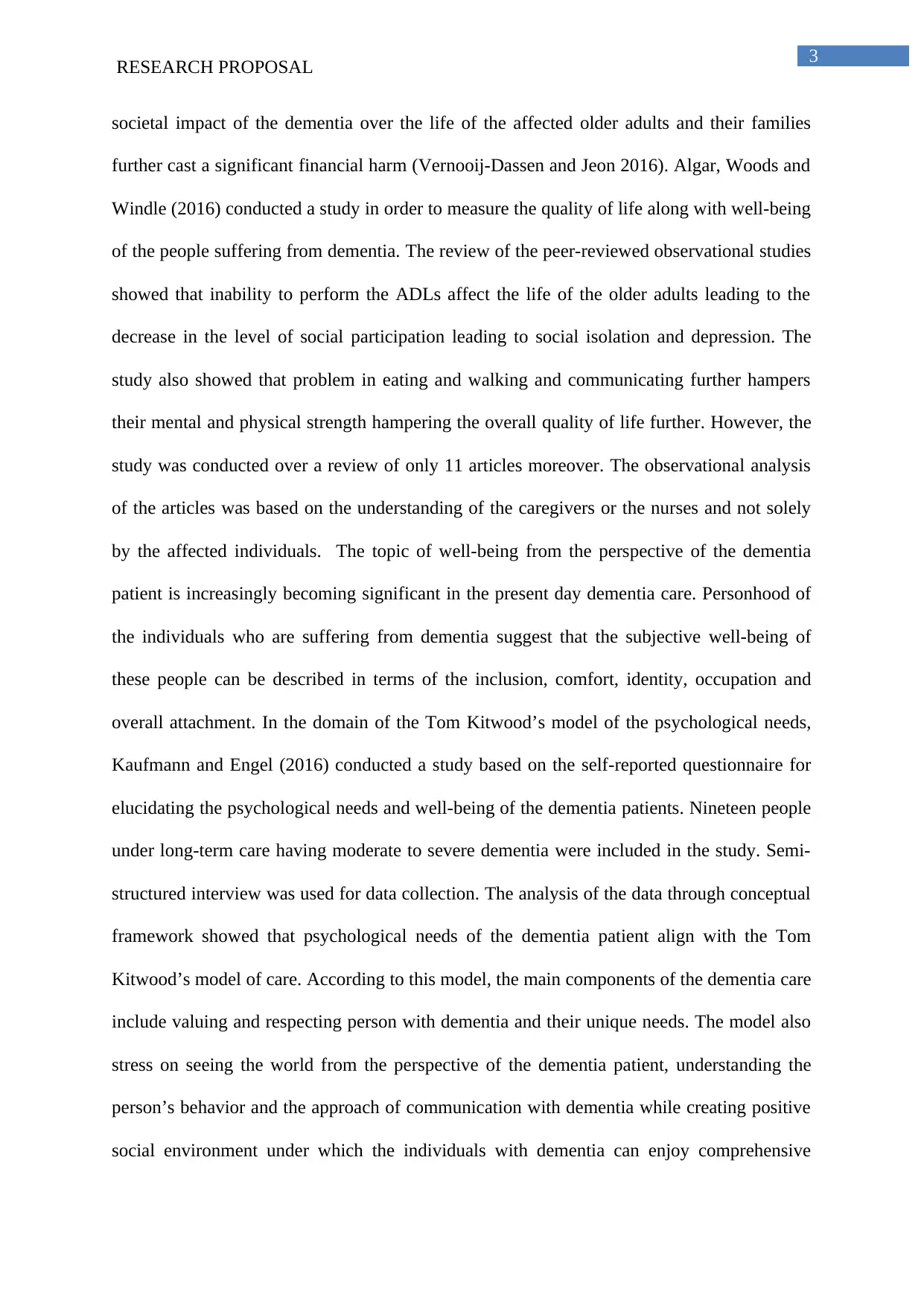
3
RESEARCH PROPOSAL
societal impact of the dementia over the life of the affected older adults and their families
further cast a significant financial harm (Vernooij-Dassen and Jeon 2016). Algar, Woods and
Windle (2016) conducted a study in order to measure the quality of life along with well-being
of the people suffering from dementia. The review of the peer-reviewed observational studies
showed that inability to perform the ADLs affect the life of the older adults leading to the
decrease in the level of social participation leading to social isolation and depression. The
study also showed that problem in eating and walking and communicating further hampers
their mental and physical strength hampering the overall quality of life further. However, the
study was conducted over a review of only 11 articles moreover. The observational analysis
of the articles was based on the understanding of the caregivers or the nurses and not solely
by the affected individuals. The topic of well-being from the perspective of the dementia
patient is increasingly becoming significant in the present day dementia care. Personhood of
the individuals who are suffering from dementia suggest that the subjective well-being of
these people can be described in terms of the inclusion, comfort, identity, occupation and
overall attachment. In the domain of the Tom Kitwood’s model of the psychological needs,
Kaufmann and Engel (2016) conducted a study based on the self-reported questionnaire for
elucidating the psychological needs and well-being of the dementia patients. Nineteen people
under long-term care having moderate to severe dementia were included in the study. Semi-
structured interview was used for data collection. The analysis of the data through conceptual
framework showed that psychological needs of the dementia patient align with the Tom
Kitwood’s model of care. According to this model, the main components of the dementia care
include valuing and respecting person with dementia and their unique needs. The model also
stress on seeing the world from the perspective of the dementia patient, understanding the
person’s behavior and the approach of communication with dementia while creating positive
social environment under which the individuals with dementia can enjoy comprehensive
RESEARCH PROPOSAL
societal impact of the dementia over the life of the affected older adults and their families
further cast a significant financial harm (Vernooij-Dassen and Jeon 2016). Algar, Woods and
Windle (2016) conducted a study in order to measure the quality of life along with well-being
of the people suffering from dementia. The review of the peer-reviewed observational studies
showed that inability to perform the ADLs affect the life of the older adults leading to the
decrease in the level of social participation leading to social isolation and depression. The
study also showed that problem in eating and walking and communicating further hampers
their mental and physical strength hampering the overall quality of life further. However, the
study was conducted over a review of only 11 articles moreover. The observational analysis
of the articles was based on the understanding of the caregivers or the nurses and not solely
by the affected individuals. The topic of well-being from the perspective of the dementia
patient is increasingly becoming significant in the present day dementia care. Personhood of
the individuals who are suffering from dementia suggest that the subjective well-being of
these people can be described in terms of the inclusion, comfort, identity, occupation and
overall attachment. In the domain of the Tom Kitwood’s model of the psychological needs,
Kaufmann and Engel (2016) conducted a study based on the self-reported questionnaire for
elucidating the psychological needs and well-being of the dementia patients. Nineteen people
under long-term care having moderate to severe dementia were included in the study. Semi-
structured interview was used for data collection. The analysis of the data through conceptual
framework showed that psychological needs of the dementia patient align with the Tom
Kitwood’s model of care. According to this model, the main components of the dementia care
include valuing and respecting person with dementia and their unique needs. The model also
stress on seeing the world from the perspective of the dementia patient, understanding the
person’s behavior and the approach of communication with dementia while creating positive
social environment under which the individuals with dementia can enjoy comprehensive
Paraphrase This Document
Need a fresh take? Get an instant paraphrase of this document with our AI Paraphraser
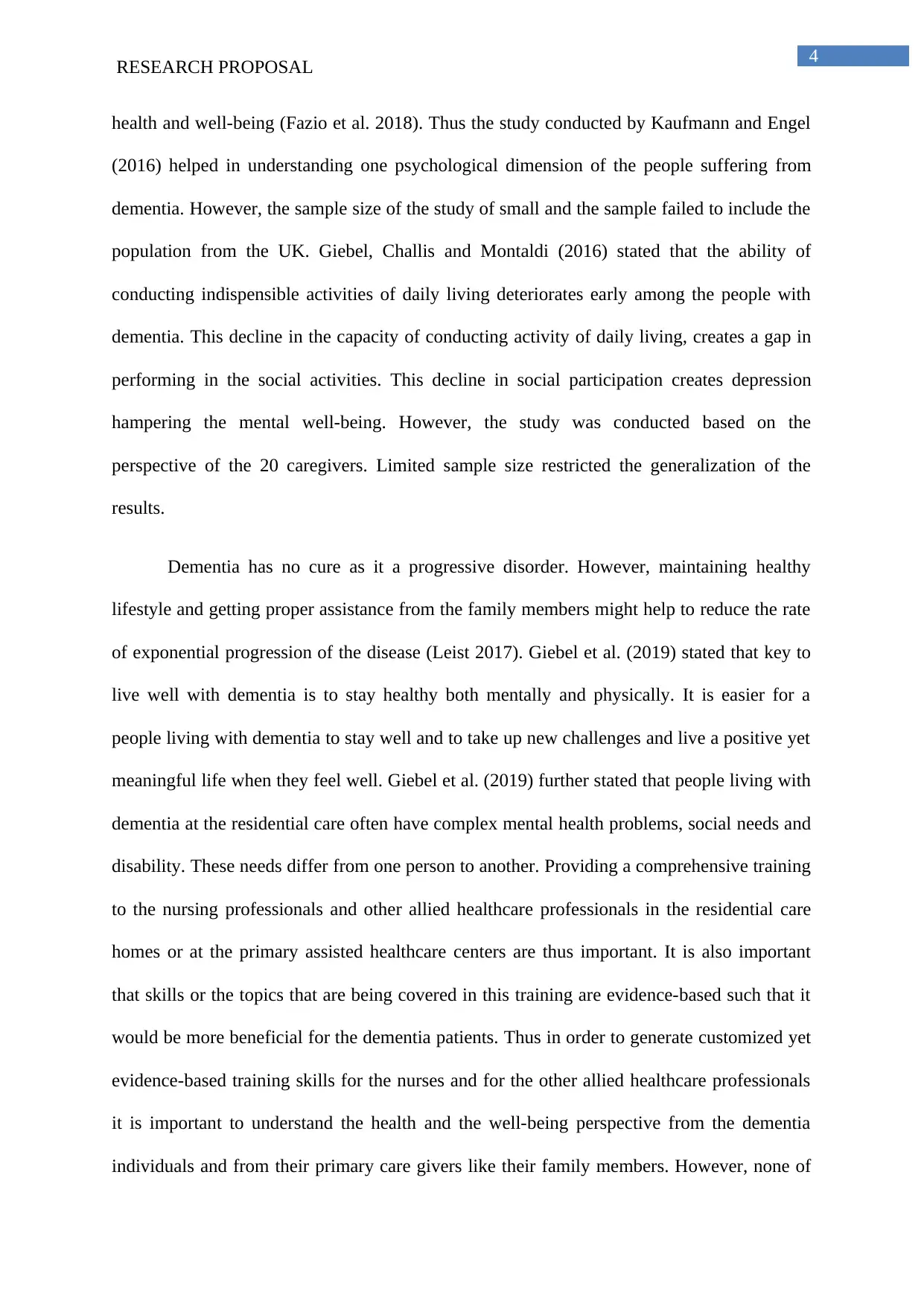
4
RESEARCH PROPOSAL
health and well-being (Fazio et al. 2018). Thus the study conducted by Kaufmann and Engel
(2016) helped in understanding one psychological dimension of the people suffering from
dementia. However, the sample size of the study of small and the sample failed to include the
population from the UK. Giebel, Challis and Montaldi (2016) stated that the ability of
conducting indispensible activities of daily living deteriorates early among the people with
dementia. This decline in the capacity of conducting activity of daily living, creates a gap in
performing in the social activities. This decline in social participation creates depression
hampering the mental well-being. However, the study was conducted based on the
perspective of the 20 caregivers. Limited sample size restricted the generalization of the
results.
Dementia has no cure as it a progressive disorder. However, maintaining healthy
lifestyle and getting proper assistance from the family members might help to reduce the rate
of exponential progression of the disease (Leist 2017). Giebel et al. (2019) stated that key to
live well with dementia is to stay healthy both mentally and physically. It is easier for a
people living with dementia to stay well and to take up new challenges and live a positive yet
meaningful life when they feel well. Giebel et al. (2019) further stated that people living with
dementia at the residential care often have complex mental health problems, social needs and
disability. These needs differ from one person to another. Providing a comprehensive training
to the nursing professionals and other allied healthcare professionals in the residential care
homes or at the primary assisted healthcare centers are thus important. It is also important
that skills or the topics that are being covered in this training are evidence-based such that it
would be more beneficial for the dementia patients. Thus in order to generate customized yet
evidence-based training skills for the nurses and for the other allied healthcare professionals
it is important to understand the health and the well-being perspective from the dementia
individuals and from their primary care givers like their family members. However, none of
RESEARCH PROPOSAL
health and well-being (Fazio et al. 2018). Thus the study conducted by Kaufmann and Engel
(2016) helped in understanding one psychological dimension of the people suffering from
dementia. However, the sample size of the study of small and the sample failed to include the
population from the UK. Giebel, Challis and Montaldi (2016) stated that the ability of
conducting indispensible activities of daily living deteriorates early among the people with
dementia. This decline in the capacity of conducting activity of daily living, creates a gap in
performing in the social activities. This decline in social participation creates depression
hampering the mental well-being. However, the study was conducted based on the
perspective of the 20 caregivers. Limited sample size restricted the generalization of the
results.
Dementia has no cure as it a progressive disorder. However, maintaining healthy
lifestyle and getting proper assistance from the family members might help to reduce the rate
of exponential progression of the disease (Leist 2017). Giebel et al. (2019) stated that key to
live well with dementia is to stay healthy both mentally and physically. It is easier for a
people living with dementia to stay well and to take up new challenges and live a positive yet
meaningful life when they feel well. Giebel et al. (2019) further stated that people living with
dementia at the residential care often have complex mental health problems, social needs and
disability. These needs differ from one person to another. Providing a comprehensive training
to the nursing professionals and other allied healthcare professionals in the residential care
homes or at the primary assisted healthcare centers are thus important. It is also important
that skills or the topics that are being covered in this training are evidence-based such that it
would be more beneficial for the dementia patients. Thus in order to generate customized yet
evidence-based training skills for the nurses and for the other allied healthcare professionals
it is important to understand the health and the well-being perspective from the dementia
individuals and from their primary care givers like their family members. However, none of
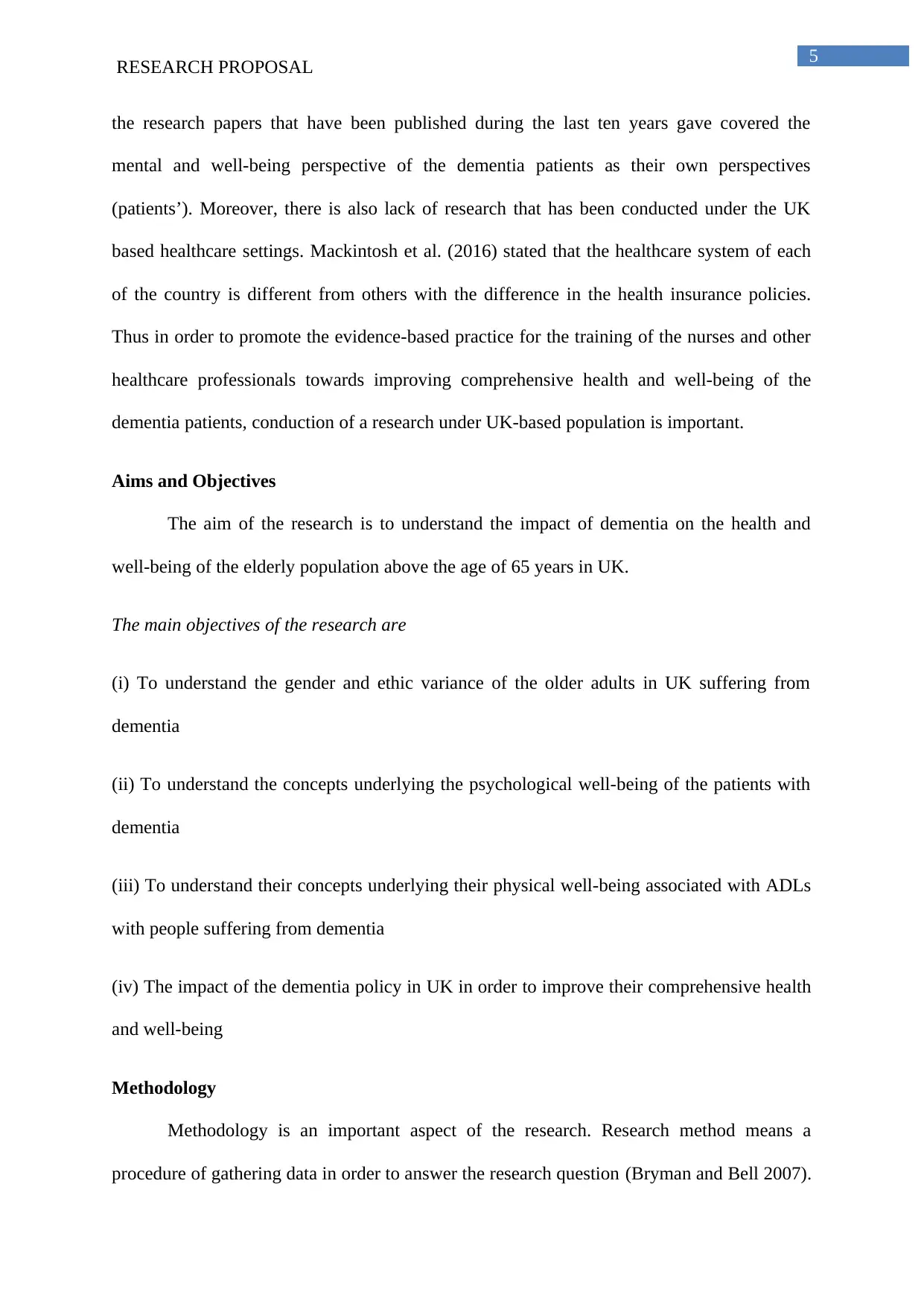
5
RESEARCH PROPOSAL
the research papers that have been published during the last ten years gave covered the
mental and well-being perspective of the dementia patients as their own perspectives
(patients’). Moreover, there is also lack of research that has been conducted under the UK
based healthcare settings. Mackintosh et al. (2016) stated that the healthcare system of each
of the country is different from others with the difference in the health insurance policies.
Thus in order to promote the evidence-based practice for the training of the nurses and other
healthcare professionals towards improving comprehensive health and well-being of the
dementia patients, conduction of a research under UK-based population is important.
Aims and Objectives
The aim of the research is to understand the impact of dementia on the health and
well-being of the elderly population above the age of 65 years in UK.
The main objectives of the research are
(i) To understand the gender and ethic variance of the older adults in UK suffering from
dementia
(ii) To understand the concepts underlying the psychological well-being of the patients with
dementia
(iii) To understand their concepts underlying their physical well-being associated with ADLs
with people suffering from dementia
(iv) The impact of the dementia policy in UK in order to improve their comprehensive health
and well-being
Methodology
Methodology is an important aspect of the research. Research method means a
procedure of gathering data in order to answer the research question (Bryman and Bell 2007).
RESEARCH PROPOSAL
the research papers that have been published during the last ten years gave covered the
mental and well-being perspective of the dementia patients as their own perspectives
(patients’). Moreover, there is also lack of research that has been conducted under the UK
based healthcare settings. Mackintosh et al. (2016) stated that the healthcare system of each
of the country is different from others with the difference in the health insurance policies.
Thus in order to promote the evidence-based practice for the training of the nurses and other
healthcare professionals towards improving comprehensive health and well-being of the
dementia patients, conduction of a research under UK-based population is important.
Aims and Objectives
The aim of the research is to understand the impact of dementia on the health and
well-being of the elderly population above the age of 65 years in UK.
The main objectives of the research are
(i) To understand the gender and ethic variance of the older adults in UK suffering from
dementia
(ii) To understand the concepts underlying the psychological well-being of the patients with
dementia
(iii) To understand their concepts underlying their physical well-being associated with ADLs
with people suffering from dementia
(iv) The impact of the dementia policy in UK in order to improve their comprehensive health
and well-being
Methodology
Methodology is an important aspect of the research. Research method means a
procedure of gathering data in order to answer the research question (Bryman and Bell 2007).
⊘ This is a preview!⊘
Do you want full access?
Subscribe today to unlock all pages.

Trusted by 1+ million students worldwide
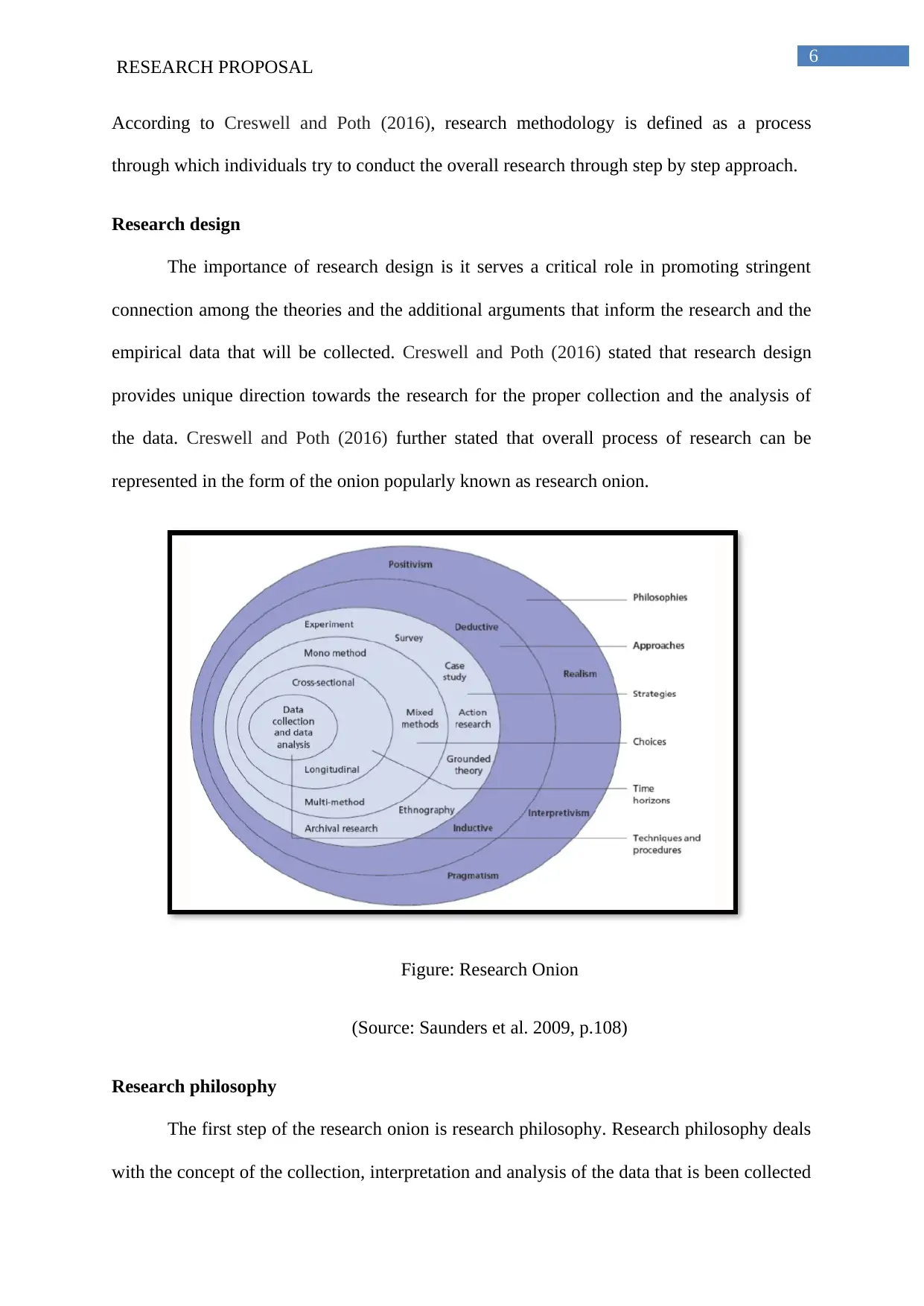
6
RESEARCH PROPOSAL
According to Creswell and Poth (2016), research methodology is defined as a process
through which individuals try to conduct the overall research through step by step approach.
Research design
The importance of research design is it serves a critical role in promoting stringent
connection among the theories and the additional arguments that inform the research and the
empirical data that will be collected. Creswell and Poth (2016) stated that research design
provides unique direction towards the research for the proper collection and the analysis of
the data. Creswell and Poth (2016) further stated that overall process of research can be
represented in the form of the onion popularly known as research onion.
Figure: Research Onion
(Source: Saunders et al. 2009, p.108)
Research philosophy
The first step of the research onion is research philosophy. Research philosophy deals
with the concept of the collection, interpretation and analysis of the data that is been collected
RESEARCH PROPOSAL
According to Creswell and Poth (2016), research methodology is defined as a process
through which individuals try to conduct the overall research through step by step approach.
Research design
The importance of research design is it serves a critical role in promoting stringent
connection among the theories and the additional arguments that inform the research and the
empirical data that will be collected. Creswell and Poth (2016) stated that research design
provides unique direction towards the research for the proper collection and the analysis of
the data. Creswell and Poth (2016) further stated that overall process of research can be
represented in the form of the onion popularly known as research onion.
Figure: Research Onion
(Source: Saunders et al. 2009, p.108)
Research philosophy
The first step of the research onion is research philosophy. Research philosophy deals
with the concept of the collection, interpretation and analysis of the data that is been collected
Paraphrase This Document
Need a fresh take? Get an instant paraphrase of this document with our AI Paraphraser
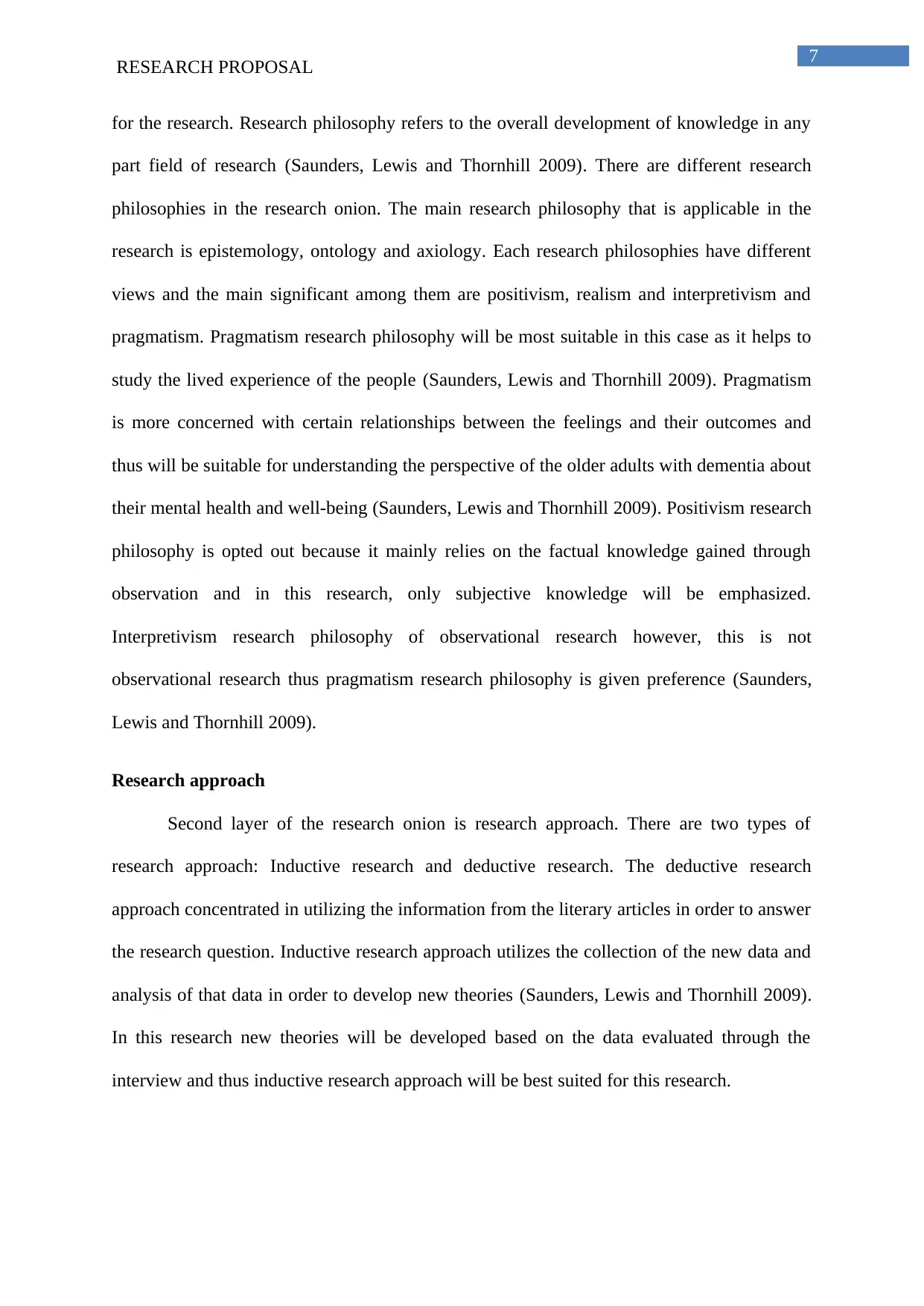
7
RESEARCH PROPOSAL
for the research. Research philosophy refers to the overall development of knowledge in any
part field of research (Saunders, Lewis and Thornhill 2009). There are different research
philosophies in the research onion. The main research philosophy that is applicable in the
research is epistemology, ontology and axiology. Each research philosophies have different
views and the main significant among them are positivism, realism and interpretivism and
pragmatism. Pragmatism research philosophy will be most suitable in this case as it helps to
study the lived experience of the people (Saunders, Lewis and Thornhill 2009). Pragmatism
is more concerned with certain relationships between the feelings and their outcomes and
thus will be suitable for understanding the perspective of the older adults with dementia about
their mental health and well-being (Saunders, Lewis and Thornhill 2009). Positivism research
philosophy is opted out because it mainly relies on the factual knowledge gained through
observation and in this research, only subjective knowledge will be emphasized.
Interpretivism research philosophy of observational research however, this is not
observational research thus pragmatism research philosophy is given preference (Saunders,
Lewis and Thornhill 2009).
Research approach
Second layer of the research onion is research approach. There are two types of
research approach: Inductive research and deductive research. The deductive research
approach concentrated in utilizing the information from the literary articles in order to answer
the research question. Inductive research approach utilizes the collection of the new data and
analysis of that data in order to develop new theories (Saunders, Lewis and Thornhill 2009).
In this research new theories will be developed based on the data evaluated through the
interview and thus inductive research approach will be best suited for this research.
RESEARCH PROPOSAL
for the research. Research philosophy refers to the overall development of knowledge in any
part field of research (Saunders, Lewis and Thornhill 2009). There are different research
philosophies in the research onion. The main research philosophy that is applicable in the
research is epistemology, ontology and axiology. Each research philosophies have different
views and the main significant among them are positivism, realism and interpretivism and
pragmatism. Pragmatism research philosophy will be most suitable in this case as it helps to
study the lived experience of the people (Saunders, Lewis and Thornhill 2009). Pragmatism
is more concerned with certain relationships between the feelings and their outcomes and
thus will be suitable for understanding the perspective of the older adults with dementia about
their mental health and well-being (Saunders, Lewis and Thornhill 2009). Positivism research
philosophy is opted out because it mainly relies on the factual knowledge gained through
observation and in this research, only subjective knowledge will be emphasized.
Interpretivism research philosophy of observational research however, this is not
observational research thus pragmatism research philosophy is given preference (Saunders,
Lewis and Thornhill 2009).
Research approach
Second layer of the research onion is research approach. There are two types of
research approach: Inductive research and deductive research. The deductive research
approach concentrated in utilizing the information from the literary articles in order to answer
the research question. Inductive research approach utilizes the collection of the new data and
analysis of that data in order to develop new theories (Saunders, Lewis and Thornhill 2009).
In this research new theories will be developed based on the data evaluated through the
interview and thus inductive research approach will be best suited for this research.
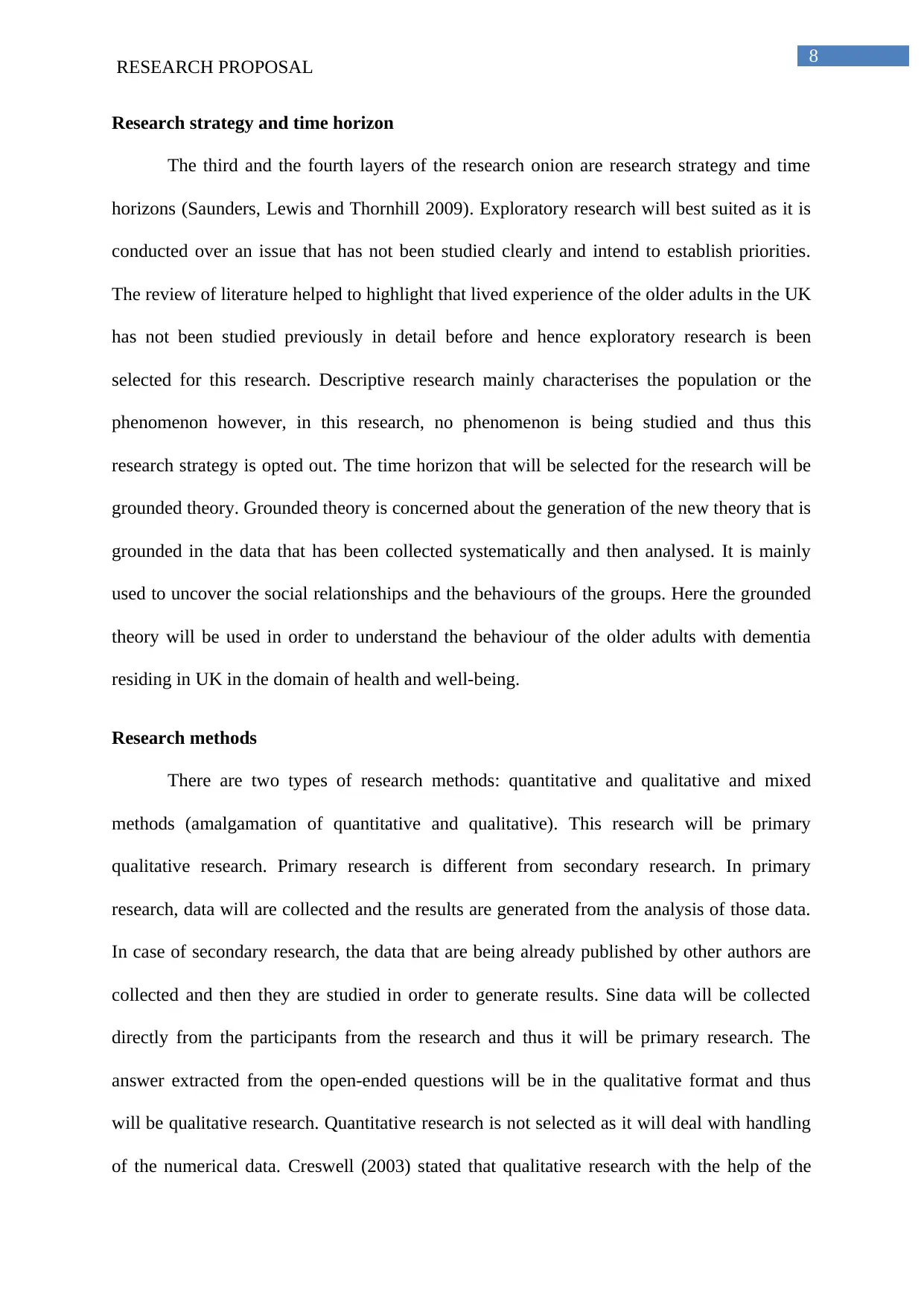
8
RESEARCH PROPOSAL
Research strategy and time horizon
The third and the fourth layers of the research onion are research strategy and time
horizons (Saunders, Lewis and Thornhill 2009). Exploratory research will best suited as it is
conducted over an issue that has not been studied clearly and intend to establish priorities.
The review of literature helped to highlight that lived experience of the older adults in the UK
has not been studied previously in detail before and hence exploratory research is been
selected for this research. Descriptive research mainly characterises the population or the
phenomenon however, in this research, no phenomenon is being studied and thus this
research strategy is opted out. The time horizon that will be selected for the research will be
grounded theory. Grounded theory is concerned about the generation of the new theory that is
grounded in the data that has been collected systematically and then analysed. It is mainly
used to uncover the social relationships and the behaviours of the groups. Here the grounded
theory will be used in order to understand the behaviour of the older adults with dementia
residing in UK in the domain of health and well-being.
Research methods
There are two types of research methods: quantitative and qualitative and mixed
methods (amalgamation of quantitative and qualitative). This research will be primary
qualitative research. Primary research is different from secondary research. In primary
research, data will are collected and the results are generated from the analysis of those data.
In case of secondary research, the data that are being already published by other authors are
collected and then they are studied in order to generate results. Sine data will be collected
directly from the participants from the research and thus it will be primary research. The
answer extracted from the open-ended questions will be in the qualitative format and thus
will be qualitative research. Quantitative research is not selected as it will deal with handling
of the numerical data. Creswell (2003) stated that qualitative research with the help of the
RESEARCH PROPOSAL
Research strategy and time horizon
The third and the fourth layers of the research onion are research strategy and time
horizons (Saunders, Lewis and Thornhill 2009). Exploratory research will best suited as it is
conducted over an issue that has not been studied clearly and intend to establish priorities.
The review of literature helped to highlight that lived experience of the older adults in the UK
has not been studied previously in detail before and hence exploratory research is been
selected for this research. Descriptive research mainly characterises the population or the
phenomenon however, in this research, no phenomenon is being studied and thus this
research strategy is opted out. The time horizon that will be selected for the research will be
grounded theory. Grounded theory is concerned about the generation of the new theory that is
grounded in the data that has been collected systematically and then analysed. It is mainly
used to uncover the social relationships and the behaviours of the groups. Here the grounded
theory will be used in order to understand the behaviour of the older adults with dementia
residing in UK in the domain of health and well-being.
Research methods
There are two types of research methods: quantitative and qualitative and mixed
methods (amalgamation of quantitative and qualitative). This research will be primary
qualitative research. Primary research is different from secondary research. In primary
research, data will are collected and the results are generated from the analysis of those data.
In case of secondary research, the data that are being already published by other authors are
collected and then they are studied in order to generate results. Sine data will be collected
directly from the participants from the research and thus it will be primary research. The
answer extracted from the open-ended questions will be in the qualitative format and thus
will be qualitative research. Quantitative research is not selected as it will deal with handling
of the numerical data. Creswell (2003) stated that qualitative research with the help of the
⊘ This is a preview!⊘
Do you want full access?
Subscribe today to unlock all pages.

Trusted by 1+ million students worldwide
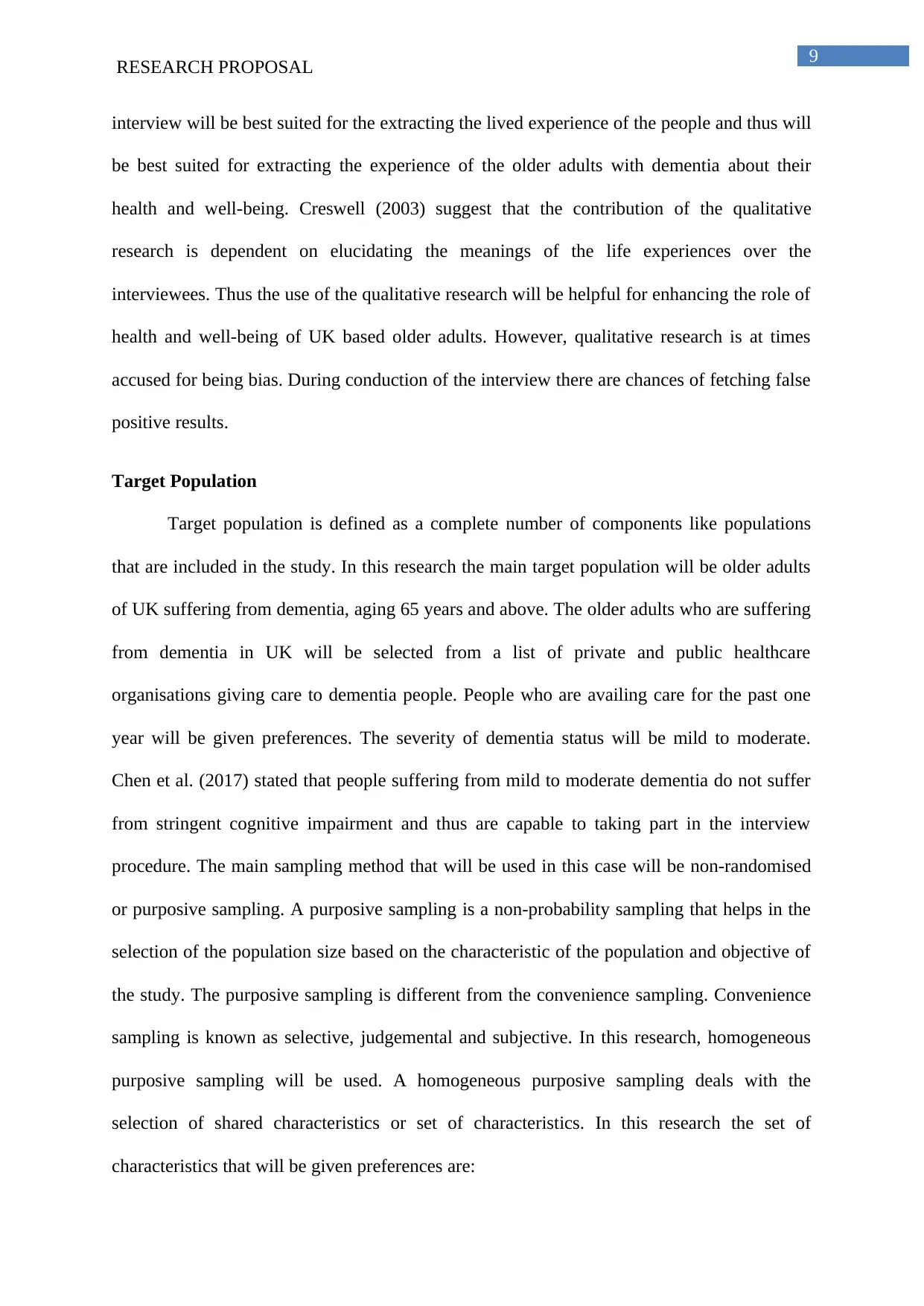
9
RESEARCH PROPOSAL
interview will be best suited for the extracting the lived experience of the people and thus will
be best suited for extracting the experience of the older adults with dementia about their
health and well-being. Creswell (2003) suggest that the contribution of the qualitative
research is dependent on elucidating the meanings of the life experiences over the
interviewees. Thus the use of the qualitative research will be helpful for enhancing the role of
health and well-being of UK based older adults. However, qualitative research is at times
accused for being bias. During conduction of the interview there are chances of fetching false
positive results.
Target Population
Target population is defined as a complete number of components like populations
that are included in the study. In this research the main target population will be older adults
of UK suffering from dementia, aging 65 years and above. The older adults who are suffering
from dementia in UK will be selected from a list of private and public healthcare
organisations giving care to dementia people. People who are availing care for the past one
year will be given preferences. The severity of dementia status will be mild to moderate.
Chen et al. (2017) stated that people suffering from mild to moderate dementia do not suffer
from stringent cognitive impairment and thus are capable to taking part in the interview
procedure. The main sampling method that will be used in this case will be non-randomised
or purposive sampling. A purposive sampling is a non-probability sampling that helps in the
selection of the population size based on the characteristic of the population and objective of
the study. The purposive sampling is different from the convenience sampling. Convenience
sampling is known as selective, judgemental and subjective. In this research, homogeneous
purposive sampling will be used. A homogeneous purposive sampling deals with the
selection of shared characteristics or set of characteristics. In this research the set of
characteristics that will be given preferences are:
RESEARCH PROPOSAL
interview will be best suited for the extracting the lived experience of the people and thus will
be best suited for extracting the experience of the older adults with dementia about their
health and well-being. Creswell (2003) suggest that the contribution of the qualitative
research is dependent on elucidating the meanings of the life experiences over the
interviewees. Thus the use of the qualitative research will be helpful for enhancing the role of
health and well-being of UK based older adults. However, qualitative research is at times
accused for being bias. During conduction of the interview there are chances of fetching false
positive results.
Target Population
Target population is defined as a complete number of components like populations
that are included in the study. In this research the main target population will be older adults
of UK suffering from dementia, aging 65 years and above. The older adults who are suffering
from dementia in UK will be selected from a list of private and public healthcare
organisations giving care to dementia people. People who are availing care for the past one
year will be given preferences. The severity of dementia status will be mild to moderate.
Chen et al. (2017) stated that people suffering from mild to moderate dementia do not suffer
from stringent cognitive impairment and thus are capable to taking part in the interview
procedure. The main sampling method that will be used in this case will be non-randomised
or purposive sampling. A purposive sampling is a non-probability sampling that helps in the
selection of the population size based on the characteristic of the population and objective of
the study. The purposive sampling is different from the convenience sampling. Convenience
sampling is known as selective, judgemental and subjective. In this research, homogeneous
purposive sampling will be used. A homogeneous purposive sampling deals with the
selection of shared characteristics or set of characteristics. In this research the set of
characteristics that will be given preferences are:
Paraphrase This Document
Need a fresh take? Get an instant paraphrase of this document with our AI Paraphraser
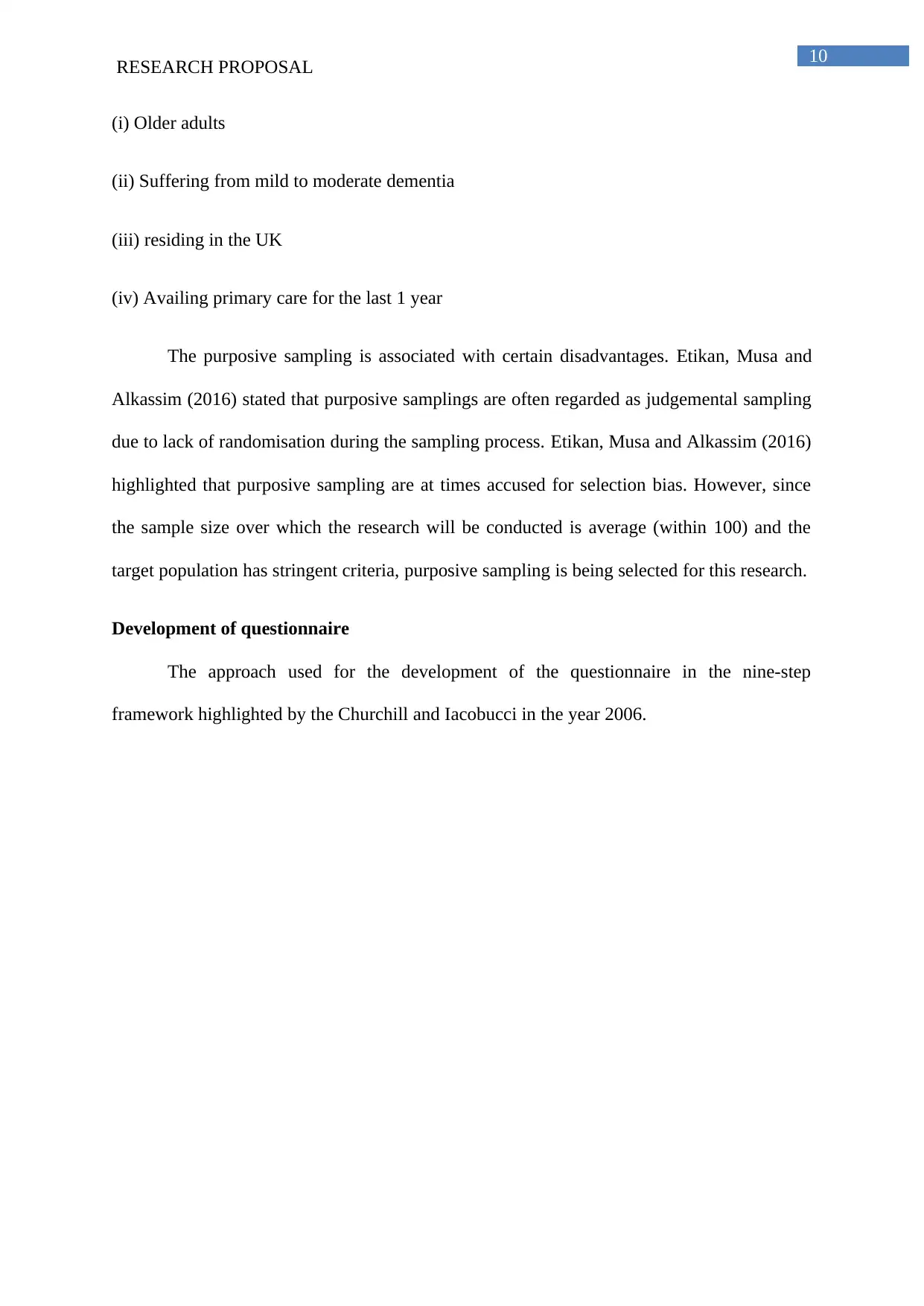
10
RESEARCH PROPOSAL
(i) Older adults
(ii) Suffering from mild to moderate dementia
(iii) residing in the UK
(iv) Availing primary care for the last 1 year
The purposive sampling is associated with certain disadvantages. Etikan, Musa and
Alkassim (2016) stated that purposive samplings are often regarded as judgemental sampling
due to lack of randomisation during the sampling process. Etikan, Musa and Alkassim (2016)
highlighted that purposive sampling are at times accused for selection bias. However, since
the sample size over which the research will be conducted is average (within 100) and the
target population has stringent criteria, purposive sampling is being selected for this research.
Development of questionnaire
The approach used for the development of the questionnaire in the nine-step
framework highlighted by the Churchill and Iacobucci in the year 2006.
RESEARCH PROPOSAL
(i) Older adults
(ii) Suffering from mild to moderate dementia
(iii) residing in the UK
(iv) Availing primary care for the last 1 year
The purposive sampling is associated with certain disadvantages. Etikan, Musa and
Alkassim (2016) stated that purposive samplings are often regarded as judgemental sampling
due to lack of randomisation during the sampling process. Etikan, Musa and Alkassim (2016)
highlighted that purposive sampling are at times accused for selection bias. However, since
the sample size over which the research will be conducted is average (within 100) and the
target population has stringent criteria, purposive sampling is being selected for this research.
Development of questionnaire
The approach used for the development of the questionnaire in the nine-step
framework highlighted by the Churchill and Iacobucci in the year 2006.
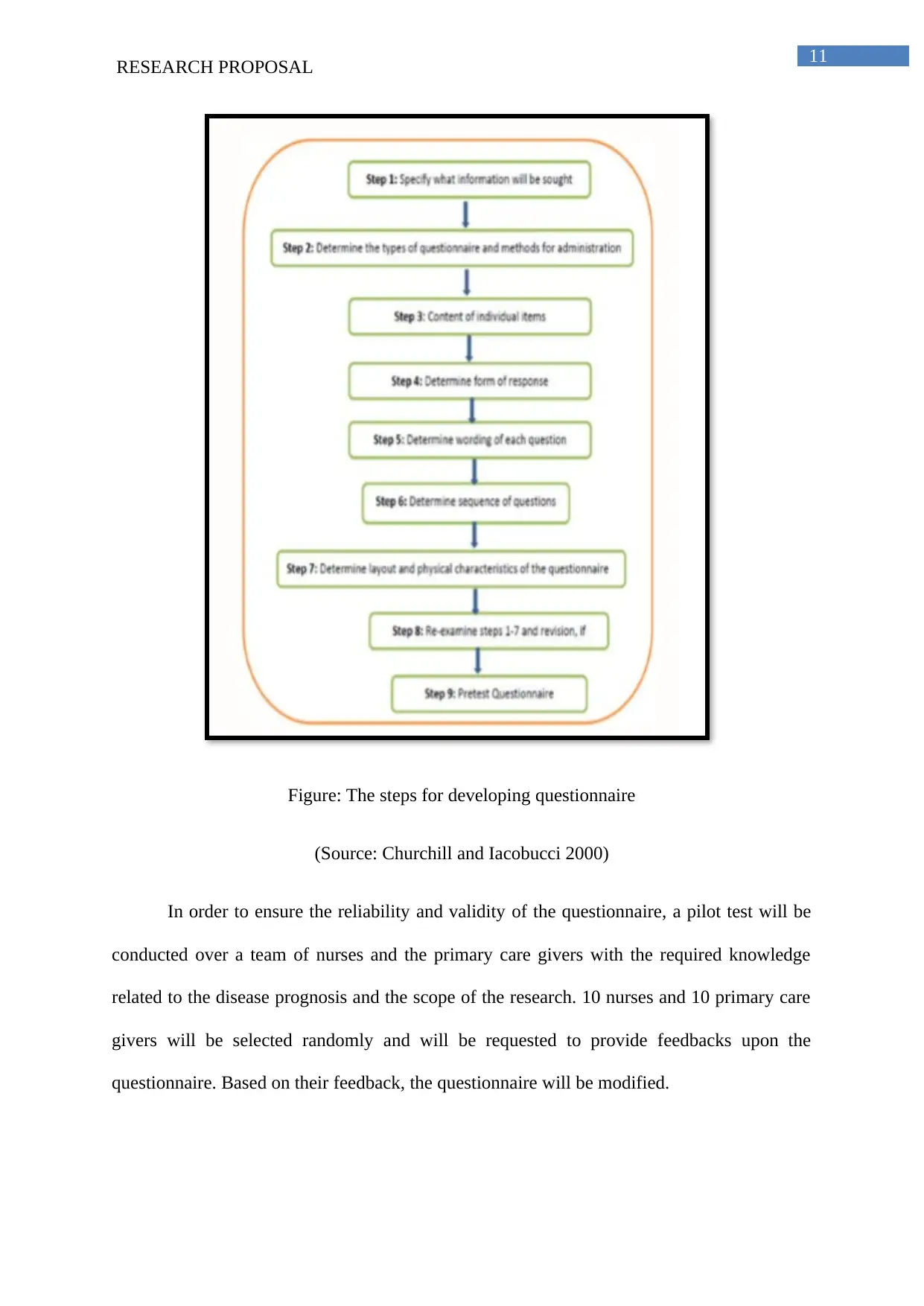
11
RESEARCH PROPOSAL
Figure: The steps for developing questionnaire
(Source: Churchill and Iacobucci 2000)
In order to ensure the reliability and validity of the questionnaire, a pilot test will be
conducted over a team of nurses and the primary care givers with the required knowledge
related to the disease prognosis and the scope of the research. 10 nurses and 10 primary care
givers will be selected randomly and will be requested to provide feedbacks upon the
questionnaire. Based on their feedback, the questionnaire will be modified.
RESEARCH PROPOSAL
Figure: The steps for developing questionnaire
(Source: Churchill and Iacobucci 2000)
In order to ensure the reliability and validity of the questionnaire, a pilot test will be
conducted over a team of nurses and the primary care givers with the required knowledge
related to the disease prognosis and the scope of the research. 10 nurses and 10 primary care
givers will be selected randomly and will be requested to provide feedbacks upon the
questionnaire. Based on their feedback, the questionnaire will be modified.
⊘ This is a preview!⊘
Do you want full access?
Subscribe today to unlock all pages.

Trusted by 1+ million students worldwide
1 out of 20
Related Documents
Your All-in-One AI-Powered Toolkit for Academic Success.
+13062052269
info@desklib.com
Available 24*7 on WhatsApp / Email
![[object Object]](/_next/static/media/star-bottom.7253800d.svg)
Unlock your academic potential
Copyright © 2020–2026 A2Z Services. All Rights Reserved. Developed and managed by ZUCOL.





